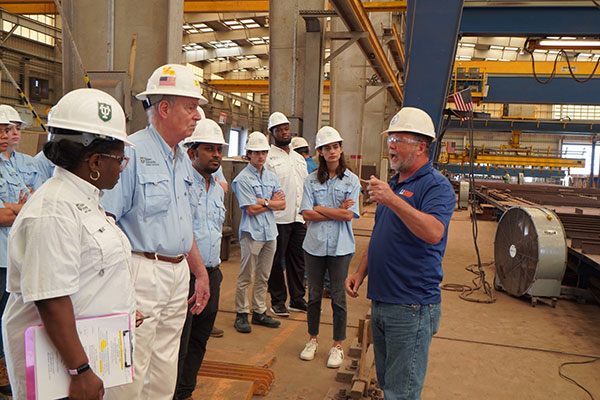
A manager with LA Ships in Houma, Louisiana, shows Prof. Eric Smith and Freeman energy students the company’s fabrication plant, which builds vessels to serve the offshore wind-power industry.
I had just arrived in New York when it happened.
It was May 8, and I had flown in for an alumni reception the next evening in the Bank of America Tower. After dropping my bags off at the hotel, I headed down to get a bite to eat. As I walked up Sixth Avenue, admiring the lights of Times Square in the distance, I missed a cutout in the sidewalk. Down I went in a heap. When I couldn’t stand up, I knew something was wrong.
An X-ray revealed that I’d ruptured the quadriceps tendon in my left knee. I would have to miss the alumni reception, our upcoming graduation ceremonies and, it turned out, nearly everything else I had planned that spring and summer.
I spent most of the next six weeks lying on my back in bed, first awaiting surgery and then in recovery (with a case of COVID in the middle for good measure). Eventually, I was able to transition to a recliner as I continued to rehabilitate my repaired knee for another four weeks.
While this wasn’t how I had intended to spend my summer, it did give me something I wouldn’t have otherwise had: Time. I spent a lot of time over the summer thinking about the Freeman School and what we’ve achieved over the last two years. Since unveiling our five-year strategic plan in October 2022, we’ve made substantial progress in almost every one of the plan’s 36 strategic action items and fully accomplished eight major goals, including completely redesigning the full-time MBA program, starting a minor in Entrepreneurial Business, launching an online MBA, establishing new certificate programs, and hiring 11 new full-time faculty members as well as several senior staff members. I couldn’t be prouder of the outstanding job our faculty and staff have done in turningthis ambitious plan into a reality.
But in addition to looking back, I was also looking forward and thinking about what we could accomplish over the next three years. At a senior leadership retreat earlier this year, Provost Forman posed two questions that neatly encapsulated what I’d been thinking about: What is the Freeman School known for? And what do we want the Freeman School to be known for?
I think most people would agree that we have an outstanding finance program, particularly in the areas of corporate finance and investment. Entrepreneurship is another historical strength, and thanks in large part to Burkenroad Reports, we’ve also earned a national reputation for experiential learning. The business of energy,
through the Tulane Energy Institute, is another unique area of excellence that we’re known for.
And what do we want to be known for? That’s a more difficult question. After much thought and consultation with faculty, staff and other stakeholders, I think one way we can make a meaningful impact and truly differentiate ourselves is by combining these things we’re already known for and applying them in new and innovative ways to address the biggest challenges of our time.
For example, if we can pull our expertise in finance, entrepreneurship, experiential learning and energy together and apply it to the transition to renewable fuel sources, we can be a model for teaching the business of energy transition — evaluating the economics of renewable energy sources, optimizing energy distribution, investigating electric vehicles and battery technologies, and managing the transition to a more sustainable future. We can become a knowledge reference for decision and policy makers when it comes to energy transition issues.
Similarly, by partnering with the Tulane Innovation Institute, we can leverage our areas of expertise to help turn ideas developed at Tulane into businesses, whether those ideas originate in physics, biomedical engineering, computer science or another department. Working with other schools and departments across the university and applying our financial modelling knowledge, experiential learning expertise and entrepreneurial skills to help commercialize their technologies would support the educational mission of all our programs while serving as a valuable differentiator from our peers.
In short, it’s something we can be proud to be known for. Over the next year, I’m looking forward to pursuing some of these exciting new opportunities and establishing an even stronger reputation for excellence and achievement.

Paulo B. Goes
Dean, A. B. Freeman School of Business
